Duty of Care and Causation in Adeels Palace v Moubarak (2009) Case
VerifiedAdded on 2022/11/25
|5
|1395
|277
Case Study
AI Summary
This case study analyzes Adeels Palace v Moubarak (2009), a significant Australian High Court decision concerning negligence and duty of care in licensed premises. The case revolves around an incident where a patron was shot at a nightclub, and the plaintiff sued the establishment for failing to provide adequate security. The analysis examines the facts, legal issues, and the court's reasoning, focusing on the application of the Civil Liability Act and the concept of causation. The court considered whether the lack of security personnel was a necessary condition for the injury, ultimately determining that it was not, as the criminal act was a deliberate wrongdoing. The judgment provides guidance on the foreseeability of harm, the responsibilities of premises owners, and the limitations of negligence claims in cases involving third-party criminal conduct. The case also references other relevant legal precedents such as Modbury Triangle Shopping Centre Pty Ltd v Anzil and Home Office v Dorset Yacht Co Ltd. The conclusion emphasizes the distinction between negligence and criminal wrongdoing, and how the court applied the "but for" test of causation.
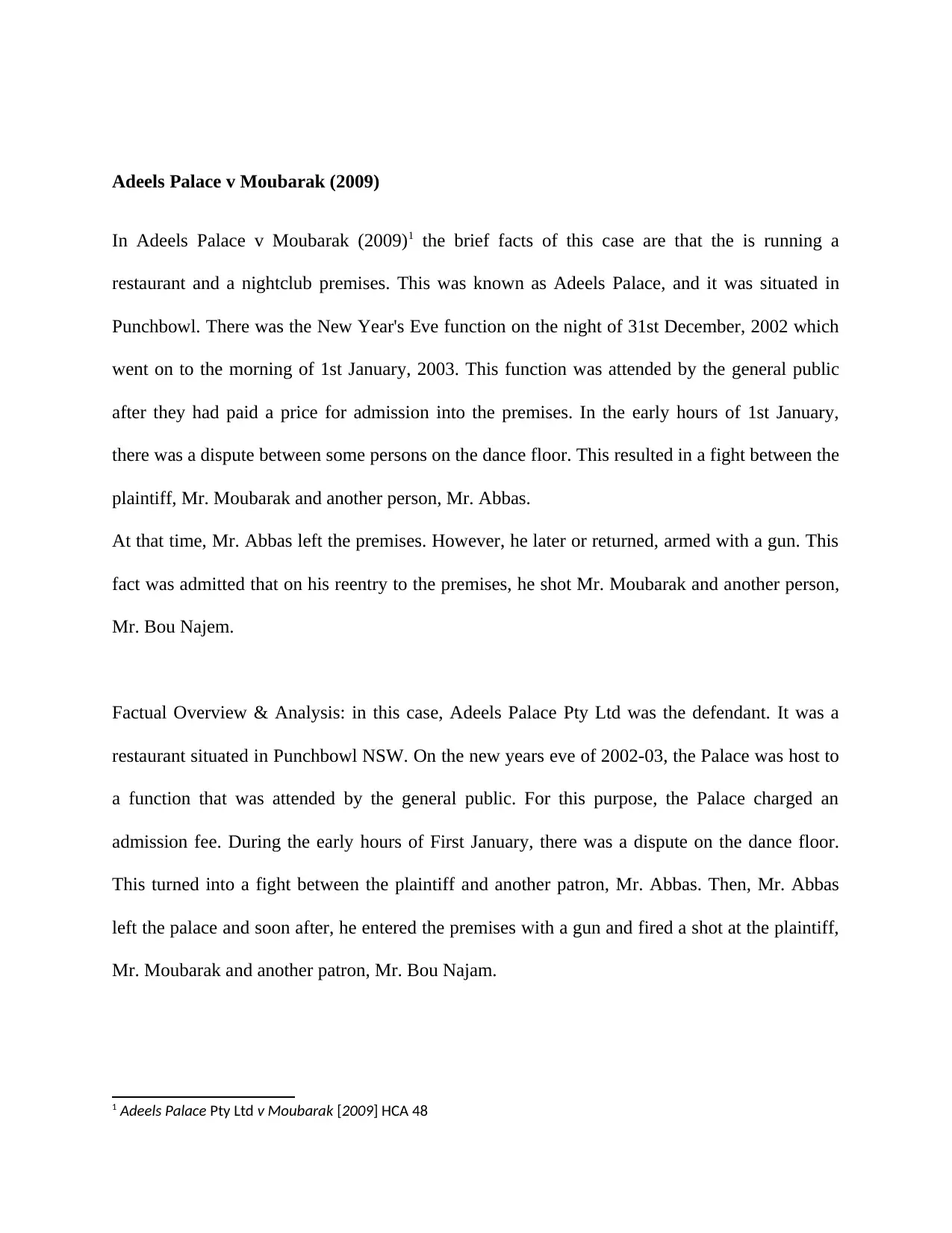
Adeels Palace v Moubarak (2009)
In Adeels Palace v Moubarak (2009)1 the brief facts of this case are that the is running a
restaurant and a nightclub premises. This was known as Adeels Palace, and it was situated in
Punchbowl. There was the New Year's Eve function on the night of 31st December, 2002 which
went on to the morning of 1st January, 2003. This function was attended by the general public
after they had paid a price for admission into the premises. In the early hours of 1st January,
there was a dispute between some persons on the dance floor. This resulted in a fight between the
plaintiff, Mr. Moubarak and another person, Mr. Abbas.
At that time, Mr. Abbas left the premises. However, he later or returned, armed with a gun. This
fact was admitted that on his reentry to the premises, he shot Mr. Moubarak and another person,
Mr. Bou Najem.
Factual Overview & Analysis: in this case, Adeels Palace Pty Ltd was the defendant. It was a
restaurant situated in Punchbowl NSW. On the new years eve of 2002-03, the Palace was host to
a function that was attended by the general public. For this purpose, the Palace charged an
admission fee. During the early hours of First January, there was a dispute on the dance floor.
This turned into a fight between the plaintiff and another patron, Mr. Abbas. Then, Mr. Abbas
left the palace and soon after, he entered the premises with a gun and fired a shot at the plaintiff,
Mr. Moubarak and another patron, Mr. Bou Najam.
1 Adeels Palace Pty Ltd v Moubarak [2009] HCA 48
In Adeels Palace v Moubarak (2009)1 the brief facts of this case are that the is running a
restaurant and a nightclub premises. This was known as Adeels Palace, and it was situated in
Punchbowl. There was the New Year's Eve function on the night of 31st December, 2002 which
went on to the morning of 1st January, 2003. This function was attended by the general public
after they had paid a price for admission into the premises. In the early hours of 1st January,
there was a dispute between some persons on the dance floor. This resulted in a fight between the
plaintiff, Mr. Moubarak and another person, Mr. Abbas.
At that time, Mr. Abbas left the premises. However, he later or returned, armed with a gun. This
fact was admitted that on his reentry to the premises, he shot Mr. Moubarak and another person,
Mr. Bou Najem.
Factual Overview & Analysis: in this case, Adeels Palace Pty Ltd was the defendant. It was a
restaurant situated in Punchbowl NSW. On the new years eve of 2002-03, the Palace was host to
a function that was attended by the general public. For this purpose, the Palace charged an
admission fee. During the early hours of First January, there was a dispute on the dance floor.
This turned into a fight between the plaintiff and another patron, Mr. Abbas. Then, Mr. Abbas
left the palace and soon after, he entered the premises with a gun and fired a shot at the plaintiff,
Mr. Moubarak and another patron, Mr. Bou Najam.
1 Adeels Palace Pty Ltd v Moubarak [2009] HCA 48
Paraphrase This Document
Need a fresh take? Get an instant paraphrase of this document with our AI Paraphraser
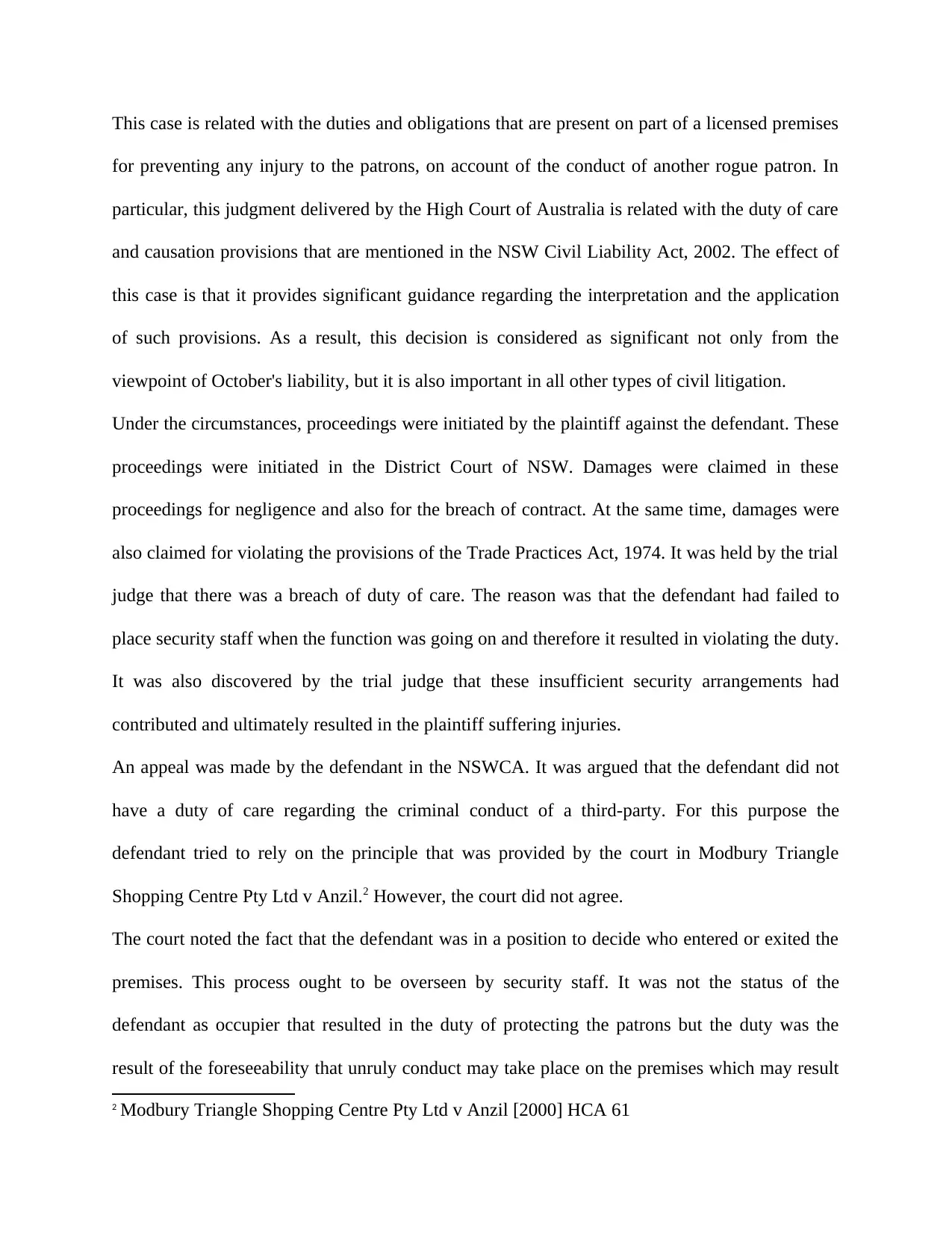
This case is related with the duties and obligations that are present on part of a licensed premises
for preventing any injury to the patrons, on account of the conduct of another rogue patron. In
particular, this judgment delivered by the High Court of Australia is related with the duty of care
and causation provisions that are mentioned in the NSW Civil Liability Act, 2002. The effect of
this case is that it provides significant guidance regarding the interpretation and the application
of such provisions. As a result, this decision is considered as significant not only from the
viewpoint of October's liability, but it is also important in all other types of civil litigation.
Under the circumstances, proceedings were initiated by the plaintiff against the defendant. These
proceedings were initiated in the District Court of NSW. Damages were claimed in these
proceedings for negligence and also for the breach of contract. At the same time, damages were
also claimed for violating the provisions of the Trade Practices Act, 1974. It was held by the trial
judge that there was a breach of duty of care. The reason was that the defendant had failed to
place security staff when the function was going on and therefore it resulted in violating the duty.
It was also discovered by the trial judge that these insufficient security arrangements had
contributed and ultimately resulted in the plaintiff suffering injuries.
An appeal was made by the defendant in the NSWCA. It was argued that the defendant did not
have a duty of care regarding the criminal conduct of a third-party. For this purpose the
defendant tried to rely on the principle that was provided by the court in Modbury Triangle
Shopping Centre Pty Ltd v Anzil.2 However, the court did not agree.
The court noted the fact that the defendant was in a position to decide who entered or exited the
premises. This process ought to be overseen by security staff. It was not the status of the
defendant as occupier that resulted in the duty of protecting the patrons but the duty was the
result of the foreseeability that unruly conduct may take place on the premises which may result
2 Modbury Triangle Shopping Centre Pty Ltd v Anzil [2000] HCA 61
for preventing any injury to the patrons, on account of the conduct of another rogue patron. In
particular, this judgment delivered by the High Court of Australia is related with the duty of care
and causation provisions that are mentioned in the NSW Civil Liability Act, 2002. The effect of
this case is that it provides significant guidance regarding the interpretation and the application
of such provisions. As a result, this decision is considered as significant not only from the
viewpoint of October's liability, but it is also important in all other types of civil litigation.
Under the circumstances, proceedings were initiated by the plaintiff against the defendant. These
proceedings were initiated in the District Court of NSW. Damages were claimed in these
proceedings for negligence and also for the breach of contract. At the same time, damages were
also claimed for violating the provisions of the Trade Practices Act, 1974. It was held by the trial
judge that there was a breach of duty of care. The reason was that the defendant had failed to
place security staff when the function was going on and therefore it resulted in violating the duty.
It was also discovered by the trial judge that these insufficient security arrangements had
contributed and ultimately resulted in the plaintiff suffering injuries.
An appeal was made by the defendant in the NSWCA. It was argued that the defendant did not
have a duty of care regarding the criminal conduct of a third-party. For this purpose the
defendant tried to rely on the principle that was provided by the court in Modbury Triangle
Shopping Centre Pty Ltd v Anzil.2 However, the court did not agree.
The court noted the fact that the defendant was in a position to decide who entered or exited the
premises. This process ought to be overseen by security staff. It was not the status of the
defendant as occupier that resulted in the duty of protecting the patrons but the duty was the
result of the foreseeability that unruly conduct may take place on the premises which may result
2 Modbury Triangle Shopping Centre Pty Ltd v Anzil [2000] HCA 61
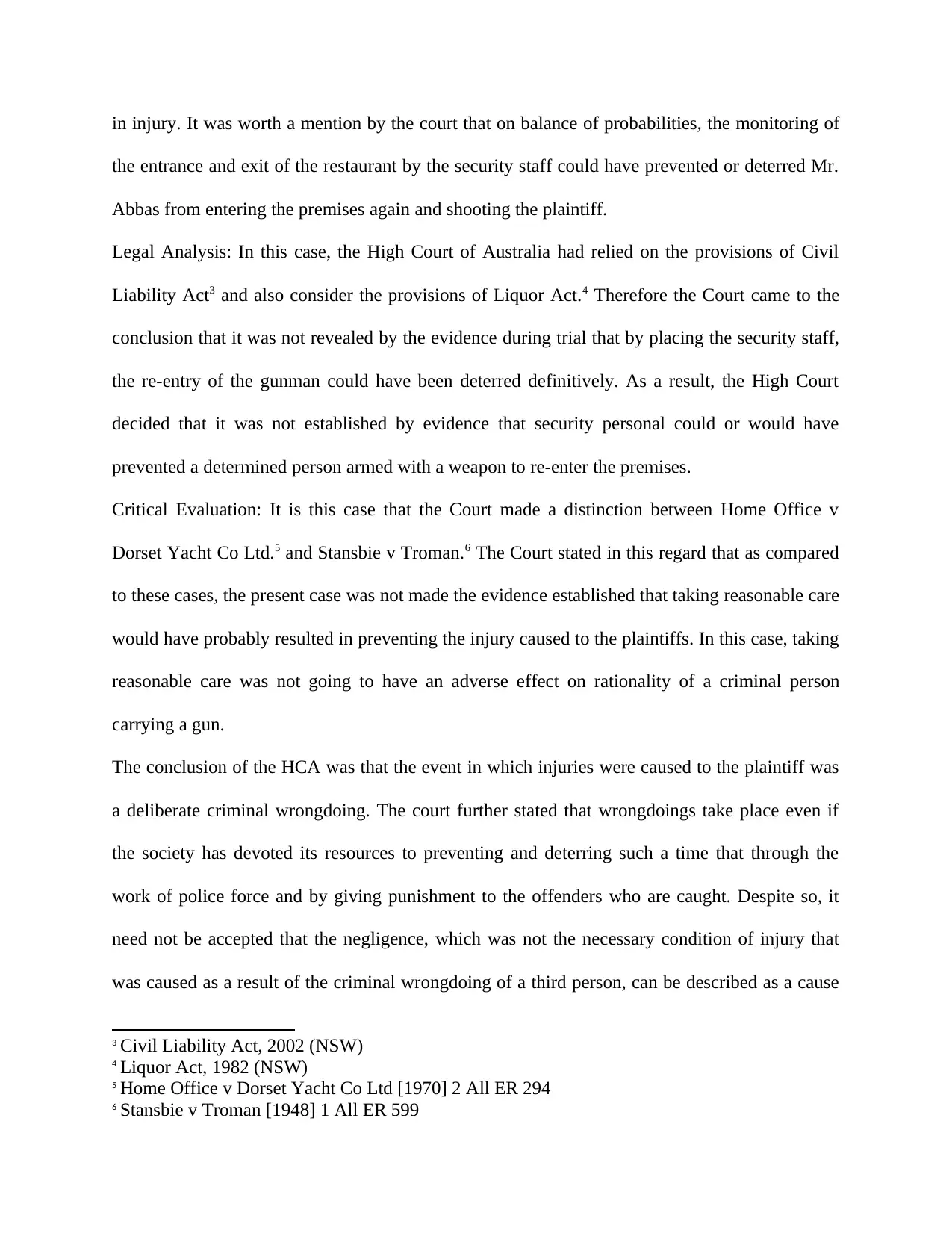
in injury. It was worth a mention by the court that on balance of probabilities, the monitoring of
the entrance and exit of the restaurant by the security staff could have prevented or deterred Mr.
Abbas from entering the premises again and shooting the plaintiff.
Legal Analysis: In this case, the High Court of Australia had relied on the provisions of Civil
Liability Act3 and also consider the provisions of Liquor Act.4 Therefore the Court came to the
conclusion that it was not revealed by the evidence during trial that by placing the security staff,
the re-entry of the gunman could have been deterred definitively. As a result, the High Court
decided that it was not established by evidence that security personal could or would have
prevented a determined person armed with a weapon to re-enter the premises.
Critical Evaluation: It is this case that the Court made a distinction between Home Office v
Dorset Yacht Co Ltd.5 and Stansbie v Troman.6 The Court stated in this regard that as compared
to these cases, the present case was not made the evidence established that taking reasonable care
would have probably resulted in preventing the injury caused to the plaintiffs. In this case, taking
reasonable care was not going to have an adverse effect on rationality of a criminal person
carrying a gun.
The conclusion of the HCA was that the event in which injuries were caused to the plaintiff was
a deliberate criminal wrongdoing. The court further stated that wrongdoings take place even if
the society has devoted its resources to preventing and deterring such a time that through the
work of police force and by giving punishment to the offenders who are caught. Despite so, it
need not be accepted that the negligence, which was not the necessary condition of injury that
was caused as a result of the criminal wrongdoing of a third person, can be described as a cause
3 Civil Liability Act, 2002 (NSW)
4 Liquor Act, 1982 (NSW)
5 Home Office v Dorset Yacht Co Ltd [1970] 2 All ER 294
6 Stansbie v Troman [1948] 1 All ER 599
the entrance and exit of the restaurant by the security staff could have prevented or deterred Mr.
Abbas from entering the premises again and shooting the plaintiff.
Legal Analysis: In this case, the High Court of Australia had relied on the provisions of Civil
Liability Act3 and also consider the provisions of Liquor Act.4 Therefore the Court came to the
conclusion that it was not revealed by the evidence during trial that by placing the security staff,
the re-entry of the gunman could have been deterred definitively. As a result, the High Court
decided that it was not established by evidence that security personal could or would have
prevented a determined person armed with a weapon to re-enter the premises.
Critical Evaluation: It is this case that the Court made a distinction between Home Office v
Dorset Yacht Co Ltd.5 and Stansbie v Troman.6 The Court stated in this regard that as compared
to these cases, the present case was not made the evidence established that taking reasonable care
would have probably resulted in preventing the injury caused to the plaintiffs. In this case, taking
reasonable care was not going to have an adverse effect on rationality of a criminal person
carrying a gun.
The conclusion of the HCA was that the event in which injuries were caused to the plaintiff was
a deliberate criminal wrongdoing. The court further stated that wrongdoings take place even if
the society has devoted its resources to preventing and deterring such a time that through the
work of police force and by giving punishment to the offenders who are caught. Despite so, it
need not be accepted that the negligence, which was not the necessary condition of injury that
was caused as a result of the criminal wrongdoing of a third person, can be described as a cause
3 Civil Liability Act, 2002 (NSW)
4 Liquor Act, 1982 (NSW)
5 Home Office v Dorset Yacht Co Ltd [1970] 2 All ER 294
6 Stansbie v Troman [1948] 1 All ER 599
⊘ This is a preview!⊘
Do you want full access?
Subscribe today to unlock all pages.

Trusted by 1+ million students worldwide
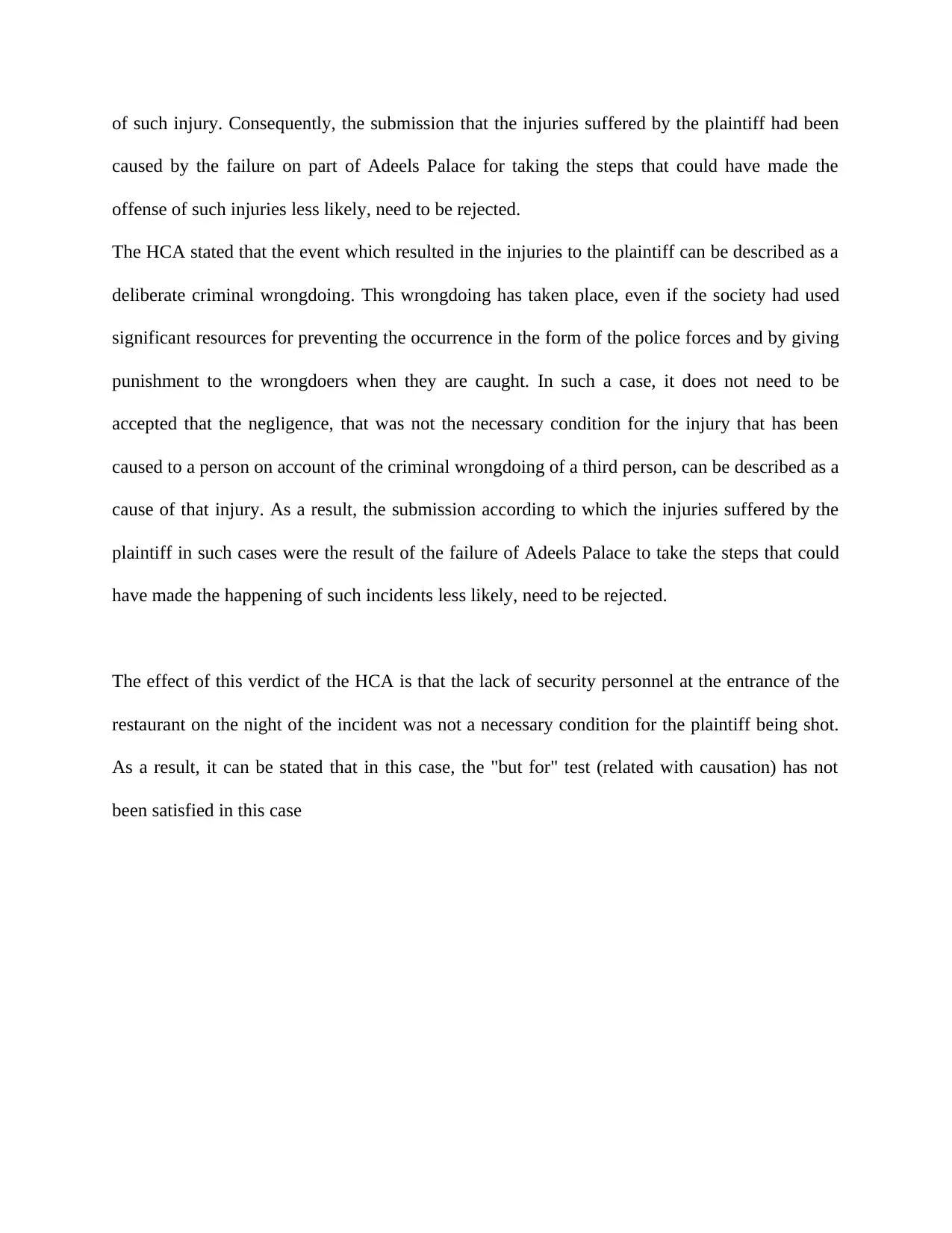
of such injury. Consequently, the submission that the injuries suffered by the plaintiff had been
caused by the failure on part of Adeels Palace for taking the steps that could have made the
offense of such injuries less likely, need to be rejected.
The HCA stated that the event which resulted in the injuries to the plaintiff can be described as a
deliberate criminal wrongdoing. This wrongdoing has taken place, even if the society had used
significant resources for preventing the occurrence in the form of the police forces and by giving
punishment to the wrongdoers when they are caught. In such a case, it does not need to be
accepted that the negligence, that was not the necessary condition for the injury that has been
caused to a person on account of the criminal wrongdoing of a third person, can be described as a
cause of that injury. As a result, the submission according to which the injuries suffered by the
plaintiff in such cases were the result of the failure of Adeels Palace to take the steps that could
have made the happening of such incidents less likely, need to be rejected.
The effect of this verdict of the HCA is that the lack of security personnel at the entrance of the
restaurant on the night of the incident was not a necessary condition for the plaintiff being shot.
As a result, it can be stated that in this case, the "but for" test (related with causation) has not
been satisfied in this case
caused by the failure on part of Adeels Palace for taking the steps that could have made the
offense of such injuries less likely, need to be rejected.
The HCA stated that the event which resulted in the injuries to the plaintiff can be described as a
deliberate criminal wrongdoing. This wrongdoing has taken place, even if the society had used
significant resources for preventing the occurrence in the form of the police forces and by giving
punishment to the wrongdoers when they are caught. In such a case, it does not need to be
accepted that the negligence, that was not the necessary condition for the injury that has been
caused to a person on account of the criminal wrongdoing of a third person, can be described as a
cause of that injury. As a result, the submission according to which the injuries suffered by the
plaintiff in such cases were the result of the failure of Adeels Palace to take the steps that could
have made the happening of such incidents less likely, need to be rejected.
The effect of this verdict of the HCA is that the lack of security personnel at the entrance of the
restaurant on the night of the incident was not a necessary condition for the plaintiff being shot.
As a result, it can be stated that in this case, the "but for" test (related with causation) has not
been satisfied in this case
Paraphrase This Document
Need a fresh take? Get an instant paraphrase of this document with our AI Paraphraser
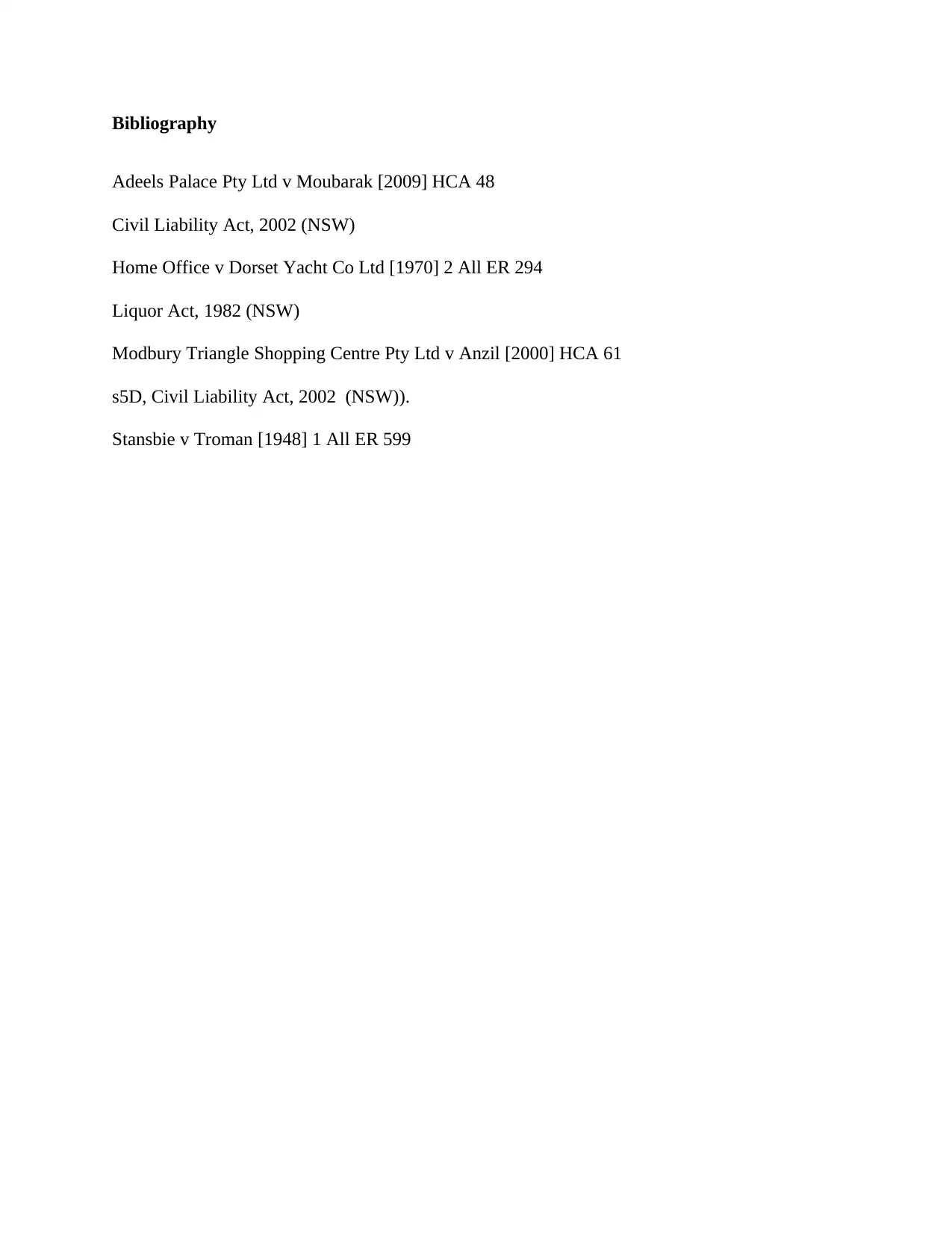
Bibliography
Adeels Palace Pty Ltd v Moubarak [2009] HCA 48
Civil Liability Act, 2002 (NSW)
Home Office v Dorset Yacht Co Ltd [1970] 2 All ER 294
Liquor Act, 1982 (NSW)
Modbury Triangle Shopping Centre Pty Ltd v Anzil [2000] HCA 61
s5D, Civil Liability Act, 2002 (NSW)).
Stansbie v Troman [1948] 1 All ER 599
Adeels Palace Pty Ltd v Moubarak [2009] HCA 48
Civil Liability Act, 2002 (NSW)
Home Office v Dorset Yacht Co Ltd [1970] 2 All ER 294
Liquor Act, 1982 (NSW)
Modbury Triangle Shopping Centre Pty Ltd v Anzil [2000] HCA 61
s5D, Civil Liability Act, 2002 (NSW)).
Stansbie v Troman [1948] 1 All ER 599
1 out of 5
Your All-in-One AI-Powered Toolkit for Academic Success.
+13062052269
info@desklib.com
Available 24*7 on WhatsApp / Email
![[object Object]](/_next/static/media/star-bottom.7253800d.svg)
Unlock your academic potential
Copyright © 2020–2026 A2Z Services. All Rights Reserved. Developed and managed by ZUCOL.
